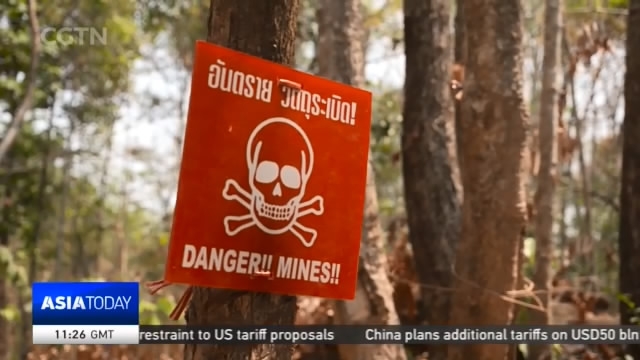
19:52, 04-Apr-2018
Landmine Legacy: Thailand aims to clear its minefields

The legacy of wars fought decades ago is still taking its toll across Southeast Asia. Deaths and injuries from landmines can be counted in the thousands-long after the fighting ended. To mark International Mine Awareness Day, Martin Lowe looks at how Thailand is trying to clear the danger from its borders.
We're searching for landmines. Suddenly they're all around us. We're in the middle of a minefield. Soldiers begin sweeping the ground with detectors when the machine beeps, they know one’s been found. The spot is marked with a red triangle. Then, slowly and gently, they brush away the soil and leaves to expose the bomb. This mine is easily big enough to kill. Carefully and methodically, the firing pin is unscrewed and the mine is made safe.
MARTIN LOWE BUNTHARIK, THAI-LAOS BORDER "There are mines everywhere here. Some have already been uncovered, but are still live and dangerous. Many, many more we find as we go along."
These bombs were planted to kill and maim enemy soldiers in war, but today it's civilians who suffer.
WIBOONRAT CHANCHOO LANDMINE VICTIM "There was a click and then the mine exploded. I flew through the air. I could see my leg flying through the air."
Clearing jungles, forests and tracks of this deadly menace is the job of the Thailand Mine Action Center, or TMAC, a specialist unit of the Thai armed forces. In the years since the fighting ended, as many as 4,000 Thai people have been killed or injured by landmines.
LIEUTENANT GENERAL SITTIPOL NIMNUAN DIRECTOR GENERAL, THAILAND MINE ACTION CENTER "In wartime when a soldier steps on a landmine they may lose a limb, an arm or a leg. It will cause delay and harm morale. But today when someone steps on a mine it will not only injure that person, but the whole family will suffer too."
TMAC had its own tragedy. Four of its de-miners were killed in a single blast while trying to defuse a mine at Sa Kaeo, a short distance from here. Soon afterwards, another de-miner was killed. The losses have been kept secret for four years now being revealed for the first time. Martin Lowe, CGTN, on the Thai-Laos border.

SITEMAP
Copyright © 2018 CGTN. Beijing ICP prepared NO.16065310-3
Copyright © 2018 CGTN. Beijing ICP prepared NO.16065310-3